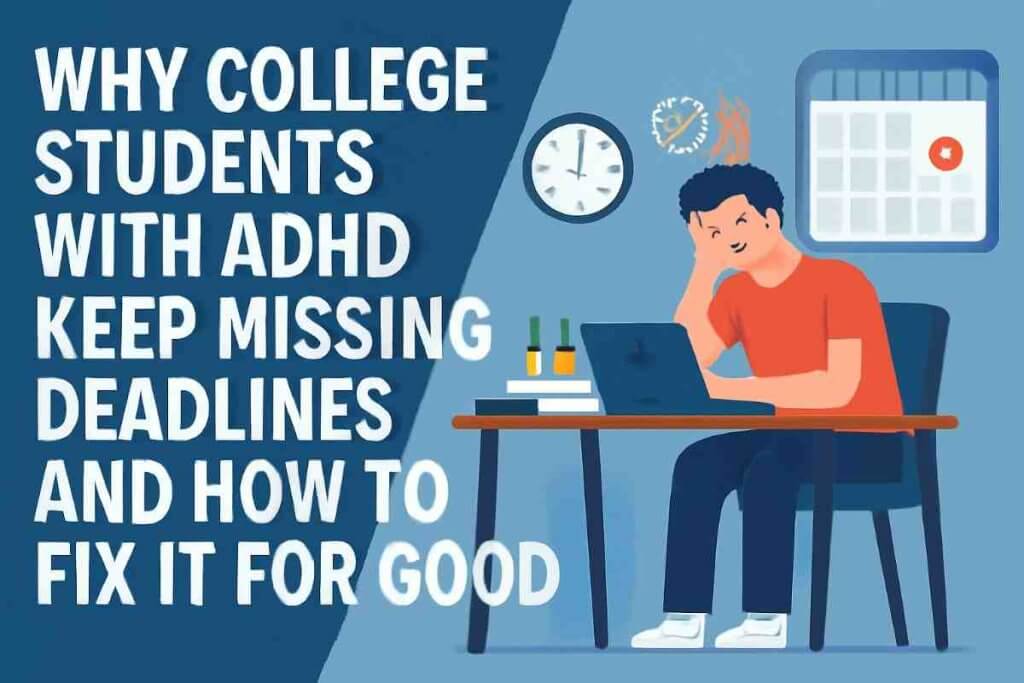College life includes deadlines. However, for college students with ADHD, deadlines tend to turn into frequent hindrances rather than directional indicators. Due to their impulsivity, lack of focus, and difficulty with time management, many students with ADHD often struggle with turning in assignments on time, missing due dates, or starting late when there is little time left. The habits are not the result of laziness or a lack of incentive, but rather the consequence of ADHD affecting attention, planning, and self-control. To break this cycle, it is essential to identify the reasons why deadlines are missed and implement practical solutions that work with the ADHD brain.
The Challenge of Time Blindness
One of the major causes of students with ADHD being unable to meet deadlines is something called time blindness. This is the challenge of knowing how much time one has spent, how much time is left, or how long a task is expected to take.
Solution: To overcome time blindness, one should make the ticking time physical and visible. This involves implementing large wall calendars, installing digital countdowns, and breaking down big tasks into smaller steps with specific dates. The visualization of time scheduling helps alleviate the possibility of underestimating the time required for processes and enables planning without feeling overwhelmed.
Overwhelm from Executive Dysfunction
Another issue is that ADHD compromises executive functioning, which is the ability to organize, plan, and prioritize tasks. Consequently, students may struggle with remembering due dates and estimating the time needed to complete various tasks, as well as making informed decisions about what to do first.
Solution: Rather than trying to cram another gear to the pedal, students require executive functioning in school systems. For more formal support, many students benefit from executive functioning classes for adults, which teach proven techniques for improving planning, organization, and follow-through.
The Impact of Lifestyle and Habits
Poor sleep patterns, irregular routine, and unhealthy nutrition can aggravate the symptoms of ADHD. The brain finds it even more challenging to concentrate, balance emotions, or decipher information when the body is exhausted or poorly fed. The habit of falling into irregular sleep routines and adopting unhealthy eating patterns may become detrimental to productivity and even lead to mood problems among many college students.
Solution: Correcting simple behavior often has a significant impact on academic work. A good sleep routine, a tidy eating habit, and even a small amount of physical exercise will contribute to the extent of attention and energy. The routines provide stability to students with ADHD, thereby minimizing the chaos that might otherwise impact their academic life.
Emotional Avoidance and Perfectionism
There are instances where the inability to complete assignments in time cannot be blamed on poor planning, but rather on emotional avoidance by students with ADHD. In cases where a student is scared of not meeting expectations or is afraid of being criticized, they may also drag out the task in order not to experience such emotions.
Solution: Emotional resilience and self-compassion are essential skills that students need to develop to overcome emotional avoidance. This will allow them to deliver work that is good enough, knowing that things must move forward rather than being perfect, and recognizing that not getting things right the first time is part of the learning process.
Lack of External Accountability
College is the first time many students have to be completely in charge in terms of time, nd do not have a parent or teacher reminding them. In a person with ADHD, such a burst of independence might result in a missed deadline and a bungled schedule. When no one is looking after you, you can notice the loss of control with assignments or forget what you should do.
Solution: It can be helpful to set up regular meetings with a study group, mentor, or academic coach to introduce structure. Such external accountability systems also serve as scaffolding to support more desirable routines and foster a sense of internal responsibility in the long run.
Conclusion
College students with ADHD miss deadlines most of the time, but it is a problem that can be resolved. It is not the result of being less able, less ambitious, or less concerned; it is the manifestation of less easy access to tools and a less ADHD-friendly attitude towards time, tasks, and planning. Whether through self-designed routines, external accountability, or enrolling in executive functioning classes for adults, every student can shift from chaos to clarity. Working out the triggers, students will be able to not only halt their failures to meet deadlines but also learn to master them, once and for all.
Cassia Rowley is the mastermind behind advertising at The Bad Pod. She blends creativity with strategy to make sure ads on our site do more than just show up—they spark interest and make connections. Cassia turns simple ad placements into engaging experiences that mesh seamlessly with our content, truly capturing the attention of our audience.


